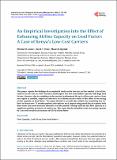| dc.contributor.author | Michael O. Aomo, David O. Oima, Moses N. Oginda | |
| dc.date.accessioned | 2020-11-23T12:21:52Z | |
| dc.date.available | 2020-11-23T12:21:52Z | |
| dc.date.issued | 2016 | |
| dc.identifier.uri | https://repository.maseno.ac.ke/handle/123456789/2921 | |
| dc.description.abstract | This paper reports the findings of an empirical study on the low-cost airline market. A lot of literatures on low-cost carriers’ business model agree that low-cost airlines operate with high load factors. However, due to variations in the market development life cycle of low-cost carriers from one region to another, empirical evidences have shown mixed results of the effect of increasing airline capacity on load factor. The paper therefore extends this analysis by examining two airlines in Kenya over 72 months period; and explores such impact using panel data to capture both time-series and cross-sectional elements over the period. Findings indicate that fleet capacity is a significant positive predictor of load factor. The paper finally underlines that increasing capacity by 1 seat will result in an increase of 0.03% in load factor. | en_US |
| dc.description.sponsorship | American Journal of Industrial and Business Management | en_US |
| dc.publisher | Scientific Research Publishing | en_US |
| dc.subject | Fleet Capacity, Load Factor, Low-Cost Carriers | en_US |
| dc.title | An Empirical Investigation into the Effect of Enhancing Airline Capacity on Load Factor: A Case of Kenya’s Low-Cost Carriers | en_US |
| dc.type | Article | en_US |

